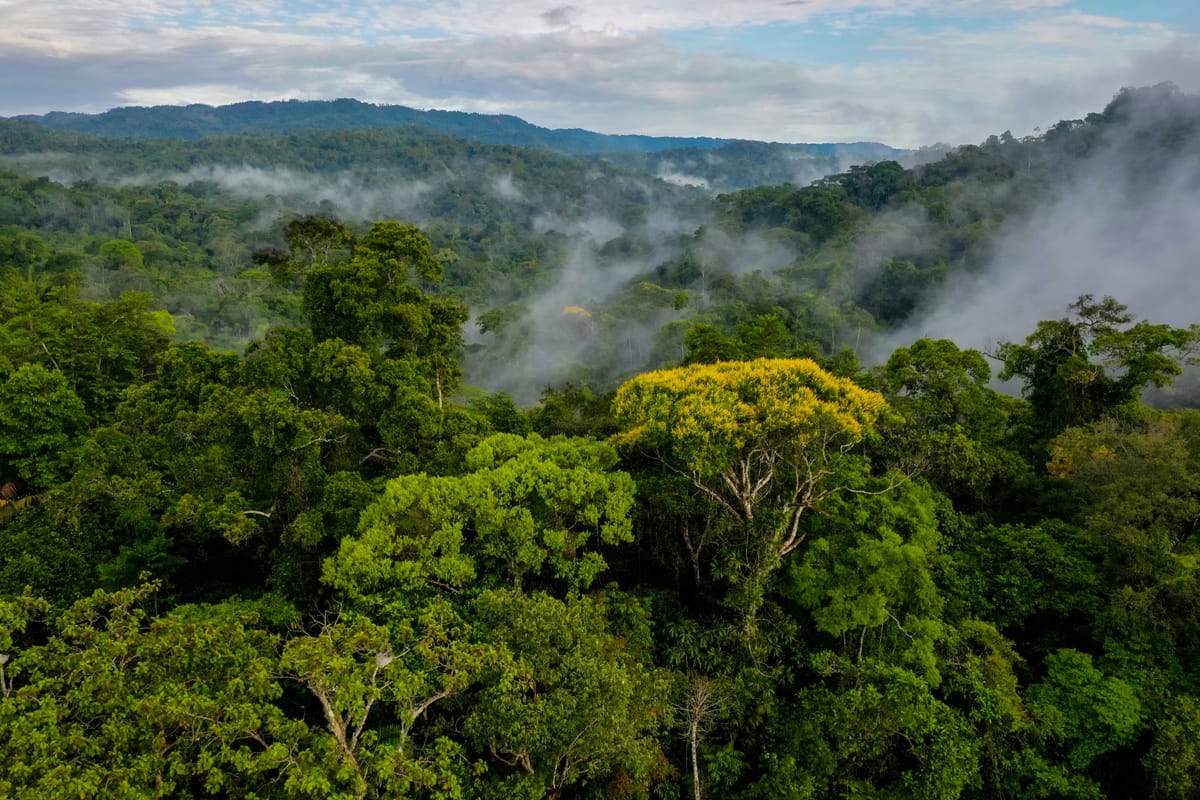This week, we're looking at Brazil's proposed $125 billion fund to protect tropical forests, Mexico's new president's plans to scale renewable energy, and efforts to rewild parks in London.
Follow Tectonic on Instagram and LinkedIn for regular updates about the innovators and innovations moving climate ambition into action.
Brazil proposes a new fund to protect tropical forests: Brazil is proposing a new fund called the Tropical Forests Forever Facility (T.F.F.F.) that would pay developing countries to protect tropical forests crucial for curbing climate change. The T.F.F.F. would rely on a $25 billion loan from rich nations and large philanthropies, which would be repaid with interest. That money would be used to attract an additional $100 billion from private investors, and the fund would reinvest this into a diversified portfolio. Investors would be paid a fixed rate of return with excess returns of as much as $4 billion annually, which would be used to pay roughly 70 developing countries based on how much tropical forest they still have standing. Brazil aims to finalize the fund's design, including its governance, by the end of the year and roll it out next year.
Hurricane Helene devastates the US Southeast: The US Southeast is facing ongoing humanitarian, economic, and ecological crises due to the historic floodwaters unleashed by Hurricane Helene, with effects expected to last for years. At least 166 people have been confirmed dead across six states, with countless others displaced, and 29 shelters are open with over 1,000 occupants. The devastating damage includes flattened cotton crops, sewage, and industrial chemicals pouring into swollen rivers, destroyed power grid components, and drowned chicken flocks in major poultry-producing states. Crop losses alone are estimated to trigger $7 billion in insurance payouts, with the future of hundreds of agricultural operations in Georgia uncertain.
Climate scientist begins term as Mexico's president: Climate scientist and former Mexico City mayor Claudia Sheinbaum was sworn in as Mexico's president on Tuesday. She vowed to expand renewable energy to 45% of total power generation in the country by the end of the decade, up from 24% in 2022. Analysts worry it is a tall order that could cost up to $50 billion and face significant technical challenges following years of underinvestment in the nation's grid.
Scaling plastic alternatives made from seaweed: Notpla, a London-based company that develops sustainable packaging materials from seaweed and plants, secured £20 million in Series A funding to accelerate its expansion and growth. Founded in 2014, the company has already replaced over 16 million single-use plastic items across Europe. Notpla plans to use the funds to expand into the North American market, scale up its manufacturing capabilities, and broaden its product range, which currently includes seaweed-coated food containers, edible liquid bubbles, and flexible film replacements. The company is the winner of both Prince William's Earthshot Prize and the TOM FORD Plastic Innovation Prize.
Maersk invests in cutting fossil fuels from plastic production: AP Møller Holding, the investment group of the Maersk family, is backing efforts to reduce fossil fuels in plastics production with a €1.5bn plastics factory in Antwerp, Belgium. The factory, which will be the first in Europe to produce plastics at scale without using fossil fuels, will run on green electricity and use green methanol made from low-carbon hydrogen or biomaterial. The new company aims to produce around 300,000 tonnes per year of polypropylene and polyethylene, accounting for about 0.14% of the current global market for the two types of plastic. The OECD estimates that plastics account for around 4% of global greenhouse gas emissions over their lifecycle, so scaling this effort could significantly cut emissions. Major challenges remain, including sourcing green methanol, securing low-cost electricity, and finding buyers willing to pay a premium for the greener product.
Explore ways we can work together.
London's parks go wild: The Royal Parks charity, which manages 5,000 acres of London's most famous public parks, including Regent's Park, has been "rewilding" its green spaces, creating wildlife habitats such as hedgerows, scrub, grasslands, and wetlands. This movement is part of a larger trend across the city, with other notable examples, including the Tower of London's moat being transformed into a wildflower garden and the Barbican Estate's wildlife garden, which has recorded over 300 species. Since 2016, London's mayor, Sadiq Khan, has invested over £28 million in greening the city, and the Rewild London Fund has helped pay for 41 projects, including restoration of wetlands, meadows, and ancient woodlands, and conservation grazing.
Formula E advancing EV technology: When it first launched in 2014, Formula E experienced significant technological limitations that resulted in cars being 100 mph slower than those in IndyCar and Formula One, with batteries lasting only half a race. In an interview in Wired, CEO Jeff Dodds explains the Formula E cars are now much faster, lighter, and more powerful, reaching top speeds of 200 mph and accelerating from 0 to 60 in under 2 seconds, with the ability to complete a race on a single charge. As technology has advanced, so has the audience, with nearly 400 million fans worldwide.
"We run the entire racing season on about 33,000 tons of carbon. All of that carbon is fully offset using grade A carbon removal schemes in the countries in which we race, fully audited by best-in-class auditors. To give you a comparison, Formula One is between 200,000 and 250,000 tons to run their racing series." - Jeff Dodds, CEO, Formula E
China invests $100 billion overseas in cleantech: Chinese firms have invested over $100 billion in overseas clean energy technology projects since the start of 2023, according to Australian research group Climate Energy Finance (CEF). China is the world's largest producer and exporter of clean energy products, accounting for 78.1% of global solar panel exports, 32.5% of electric vehicle exports, and 24.1% of lithium battery exports. The primary motivation behind these investments is to circumvent tariffs and trade barriers imposed by countries such as the United States and Canada, which have already implemented 100% tariffs on China-made electric vehicles.
The United Kingdom invests $29 billion in carbon storage: The British government announced its support for two large proposals to capture carbon dioxide emissions from industrial plants and store them beneath the sea. The proposals, led by energy giants BP and Eni, are located in industrial zones at Teesside in Northeast England and near Liverpool in the Northwest, and aim to establish an industry in burying emissions from industrial plants. The proposals involve capturing carbon dioxide emissions from polluting industries like electric power or cement plants and storing them in rock formations under the sea, with the goal of storing 8.5 million metric tons of carbon dioxide per year. The government has committed to providing £22 billion (approximately $29 billion) in funding for these plans over 25 years, which are expected to create 4,000 jobs and support 50,000 others.
Solar power to meet most of Europe's power demand in winter: The growth in European solar capacity is expected to meet most of the region's power demand growth during the winter months, with new solar generation supplying as much as 20 terawatt-hours of the 36 terawatt-hour increase in power consumption from October to March. According to consulting firm ICIS, the 2.2% rise in power consumption during this period will be largely satisfied by the expansion of solar power, led by Germany, which has been driven by lower costs and an encouraging regulatory framework.
Shipping companies prepare for global tax on emissions: Maersk expects the International Maritime Organization (IMO) to approve a global charge on greenhouse gas emissions from vessels in 2025 as part of new regulations to reduce emissions from the shipping industry. The IMO aims to finalize the new rules next year, with the goal of implementing them in 2027. This would be a world first in imposing a global, mandatory pricing mechanism for greenhouse gas emissions. Maersk leadership considered a proposal from Japan for $60 per ton of emissions as reasonable. The shipping industry contributes about one gigaton of carbon emissions annually, or around 3% of overall emissions, carries over 80% of world trade, and mostly relies on fossil fuels.
Learn more about Tectonic's creative agency.


